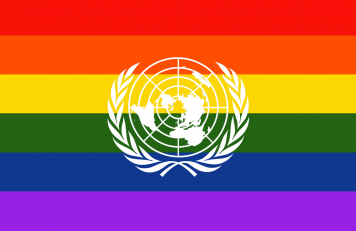The first-ever U.N. Security Council meeting on an LGBT-specific issue that took place on the 24th of August, 2015 focused on the Islamic State’s ongoing persecution of LGBT Syrians and Iraqis.
The U.S. and Chile co-sponsored the closed-door, informal briefing that highlighted the Sunni militant group’s continued persecution of LGBT Syrians and Iraqis who live under its control.
U.N. Deputy Secretary-General Jan Eliasson, U.S. Ambassador to the U.N. Samantha Power, Chile Ambassador to the U.N. Cristian Barros-Melet and International Gay and Lesbian Human Rights Commission Executive Director Jessica Stern spoke during the closed-door briefing that the U.S. and Chile co-sponsored.
A gay Iraqi man who used the pseudonym “Adnan” to protect his identity spoke to the council via telephone. Subhi Nahas, a gay man from the Syrian city of Idleb who received refugee status from the U.N. High Commission on Refugees and now lives in San Francisco, spoke during the briefing on behalf of the Organization for Refuge, Asylum and Migration.
Nahas fled to Lebanon in 2012 after Jabhat al-Nusra, a militant group affiliated with al-Qaida, took control of his hometown. He later moved to Turkey where he remained until U.S. authorities allowed him to resettle in this country.
“I have witnessed with my own eyes the annihilation of civility and humanity as I knew them,” Nahas told members of the council. “For millions of Syrians both in and outside the country, time is running out. For my compatriots who do not conform to gender and sexual norms, the eleventh hour has already passed. They need your help now.”
The Government of the Republic of Lithuania refrains from commenting on the U.N. Security Council meeting
While the diplomats from the African countries of Chad and Angola did not attend the briefing and the representatives from China, Russia, Nigeria and Malaysia who were in attendance did not speak, the representatives from 11 of the 15 countries, including Lithuania, spoke during the closed-door briefing. However, the Ministry of Foreign Affairs of the Republic of Lithuania refrains from commenting the meeting on safety of LGBT* persons. There is no information about the U.N. Security Council meeting in the official website of Lithuania’s membership in the Security Council, otherwise vocal about Lithuania’s achievements in the U.N. Security Council.
On the 17th of October, 2013 Lithuania was elected to the UNSC for 2014 and 2015 receiving an impressive 187 affirmative votes from 193 UN member states. During the term in the Security Council, Lithuania chairs the Security Council’s Counter-Terrorism Committee and the Sanctions Committees concerning the Central African Republic and Yemen.
Along with Lithuania in 2014 the non-permanent member states of the Security Council were Argentina, Australia, Chad, Chile, Jordan, Luxembourg, Nigeria, Republic of Korea, and Rwanda. In 2015 non-permanent UN Security Council member states are Angola, Chad, Chile, Jordan, Lithuania, Malaysia, New Zealand, Nigeria, Spain and Venezuela.
The national LGBT* rights organization LGL expresses its grave concern over the events in the Middle East and thus is very pleased that the U.N. Security Council took action and strongly supports their work. The association LGL hopes that Lithuania’s representatives at the U.N. Security Council will explore further possibilities of informing civil society and all interested parties about Lithuania’s contribution to international efforts to ensure safety of LGBT* persons.




